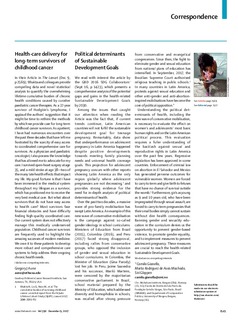Political determinants of sustainable development goals
Abstract
We read with interest the article by the GBD 2016 SDG Collaborators 1 (Sept 16, p 1423), which presents a comprehensive analysis of the potential gaps and gains in the health-related Sustainable Development Goals by 2030. Among the issues that caught our attention when reading the Article was the fact that, if current trends continue, Latin American countries will not fulfill the sustainable development goal for teenage pregnancy. Remarkably, data show that underperformance on adolescent pregnancy in Latin America happened despite positive developments towards meeting family planning needs and universal health coverage goals. This projection for adolescent pregnancy concurs with other reports showing Latin America as the only region globally where adolescent pregnancies are not decreasing, 2 and provides strong evidence for the need for in-depth analysis of political determinants of health. Over the past two decades, a massive wave of pro-family mobilisation has swept Latin America. An example of this new wave of conservative mobilisation is the campaign against so-called gender ideology in school curriculums. Ministers of Education from Brazil (2015), Colombia (2016), and Peru (2017) faced strong disapproval, including rallies from conservative groups, who opposed the inclusion of gender and sexual education in school curriculums. In Colombia, the Minister of Education (Gina Parody) lost her job. In Peru, Jaime Saavedra and his successor, Marilú Martens, were censored by the majoritarian conservative parliament. In Brazil, school material prepared by the Ministry of Education, which addressed diversity and homophobia in schools, was recalled after strong pressure from conservative and evangelical congressmen. Since then, the fight to eliminate gender and sexual education from national plans of education has intensified. In September, 2017, the Brazilian Supreme Court authorised religious teaching in public schools. 3 In man
